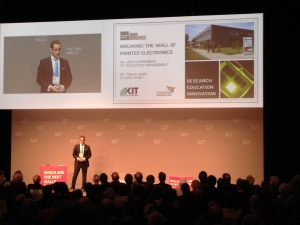“The Falling Walls Conference focuses on scientific breakthroughs and developments having the potential to change the world. When a research-oriented KIT spinoff in the area of OLED as a key techno-logy wins the competition, this is a great success,” says Professor Detlef Löhe, KIT Vice President for Research and Information. He nominated cynora GmbH together with the Head of the Innovation Management Service Unit, Dr. Jens Fahrenberg.
Transparent foils for windows that illuminate the apartment during the night, foils charging the laptop or mobile phone when the sun is shining, flexible screens and self-luminous packagings – these are only some applications that will be possible in the future thanks to organic electronics. Instead of the very rare metal iridium that is applied in displays of mobile phones today, cynora GmbH uses copper for the production of light-emitting materials. “Copper is much more abundant. In certain areas, it is technically advantageous over the rare iridium,” cynora founder Tobias Grab says. “Moreover, iridium requires a very complex vacuum deposition process that is not needed when using copper. We have now found the key to printed flexible electronics – everything will light up in the future.” Grab relies on a new chemical design, in which an organic compound (ligand) surrounds the copper and displaces its electronic structure such that energy is emitted efficiently in the form of light.
In the “Falling Walls Venture” competition, Tobias Grab won over another 20 nominated companies. This event is part of the International Falling Walls Conference. As a tradition, it takes place in Berlin on the anniversary day of the fall of the Berlin wall on November 09. 20 international top researchers are invited to report about scientific breakthroughs in natural and social sciences and the humanities.
About cynora GmbH
cynora GmbH was established in 2003 and has been headed by a new management team since 2008. The company concentrates on studying novel organic semiconductors that may be applied as luminophores in organic light-emitting diodes (OLED). cynora covers the complete spectrum of material and component development, from the design of new functional molecules for organic light-emitting diodes to their manufacture at the laboratory to comprehensive testing of the materials to production of OLED components. The company presently has a young and dynamic team of 24 employees working on further increasing the efficiency and on improving cost-effective processing and service life of the OLED. The company owns more than 60 patent applications and is supported by experienced venture investors. Printing of optoelectronic components requires new, smart materials and concepts. Such components may be used in displays, packagings, light sources, design objects, and solar cells for energy production.
Further information: www.cynora.com
Being “The Research University in the Helmholtz Association”, KIT creates and imparts knowledge for the society and the environment. It is the objective to make significant contributions to the global challenges in the fields of energy, mobility, and information. For this, about 10,000 employees cooperate in a broad range of disciplines in natural sciences, engineering sciences, economics, and the humanities and social sciences. KIT prepares its 22,800 students for responsible tasks in society, industry, and science by offering research-based study programs. Innovation efforts at KIT build a bridge between important scientific findings and their application for the benefit of society, economic prosperity, and the preservation of our natural basis of life. KIT is one of the German universities of excellence.

